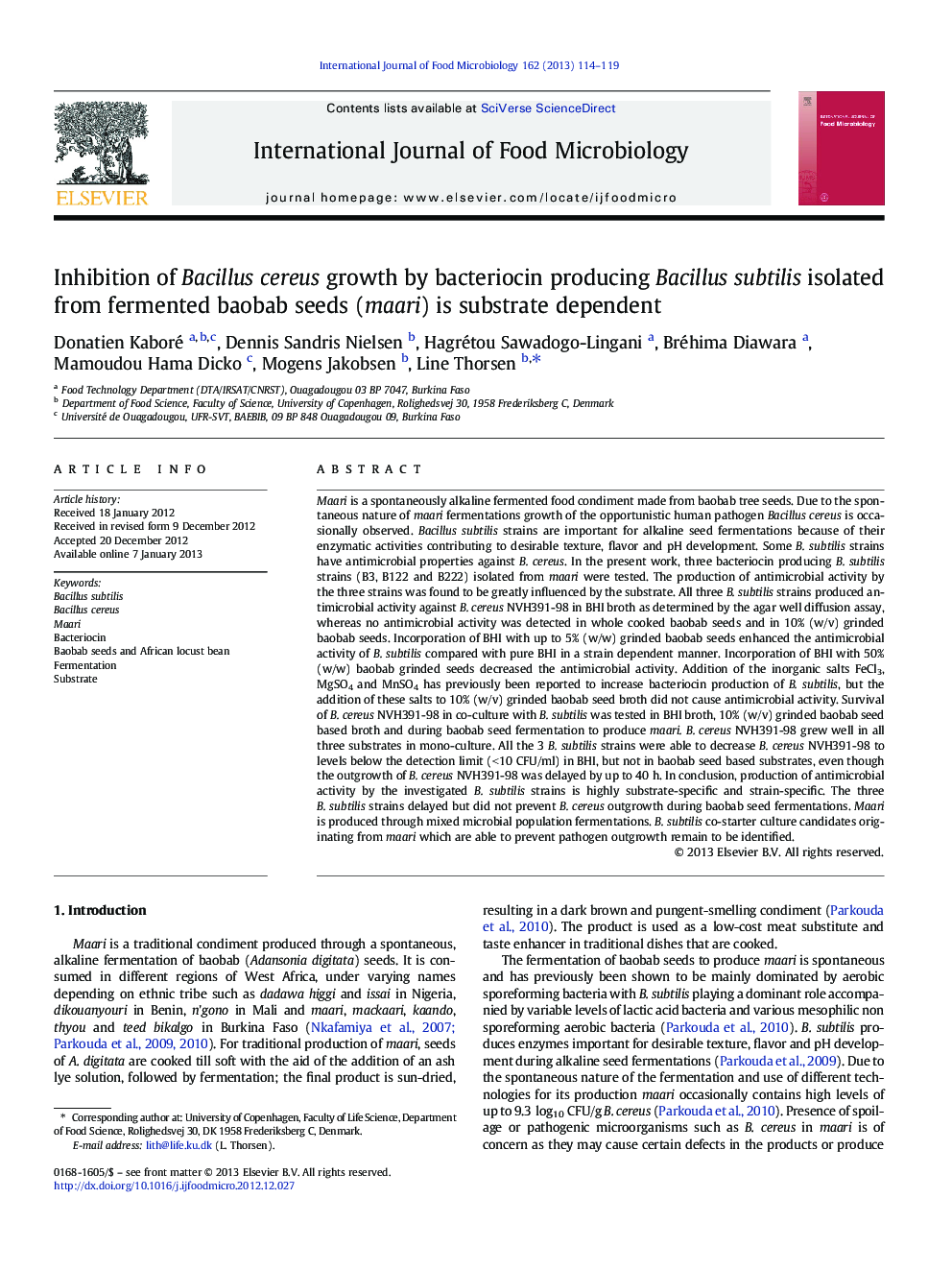| کد مقاله | کد نشریه | سال انتشار | مقاله انگلیسی | نسخه تمام متن |
|---|---|---|---|---|
| 4367244 | 1616629 | 2013 | 6 صفحه PDF | دانلود رایگان |

Maari is a spontaneously alkaline fermented food condiment made from baobab tree seeds. Due to the spontaneous nature of maari fermentations growth of the opportunistic human pathogen Bacillus cereus is occasionally observed. Bacillus subtilis strains are important for alkaline seed fermentations because of their enzymatic activities contributing to desirable texture, flavor and pH development. Some B. subtilis strains have antimicrobial properties against B. cereus. In the present work, three bacteriocin producing B. subtilis strains (B3, B122 and B222) isolated from maari were tested. The production of antimicrobial activity by the three strains was found to be greatly influenced by the substrate. All three B. subtilis strains produced antimicrobial activity against B. cereus NVH391-98 in BHI broth as determined by the agar well diffusion assay, whereas no antimicrobial activity was detected in whole cooked baobab seeds and in 10% (w/v) grinded baobab seeds. Incorporation of BHI with up to 5% (w/w) grinded baobab seeds enhanced the antimicrobial activity of B. subtilis compared with pure BHI in a strain dependent manner. Incorporation of BHI with 50% (w/w) baobab grinded seeds decreased the antimicrobial activity. Addition of the inorganic salts FeCl3, MgSO4 and MnSO4 has previously been reported to increase bacteriocin production of B. subtilis, but the addition of these salts to 10% (w/v) grinded baobab seed broth did not cause antimicrobial activity. Survival of B. cereus NVH391-98 in co-culture with B. subtilis was tested in BHI broth, 10% (w/v) grinded baobab seed based broth and during baobab seed fermentation to produce maari. B. cereus NVH391-98 grew well in all three substrates in mono-culture. All the 3 B. subtilis strains were able to decrease B. cereus NVH391-98 to levels below the detection limit (< 10 CFU/ml) in BHI, but not in baobab seed based substrates, even though the outgrowth of B. cereus NVH391-98 was delayed by up to 40 h. In conclusion, production of antimicrobial activity by the investigated B. subtilis strains is highly substrate-specific and strain-specific. The three B. subtilis strains delayed but did not prevent B. cereus outgrowth during baobab seed fermentations. Maari is produced through mixed microbial population fermentations. B. subtilis co-starter culture candidates originating from maari which are able to prevent pathogen outgrowth remain to be identified.
► Antimicrobial activity production of 3 B. subtilis strains is substrate dependent.
► Antimicrobial activity level produced in baobab seed based broth is strain dependent.
► B. subtilis B3, B122 and B222 affected growth of B. cereus in baobab seeds differently.
Journal: International Journal of Food Microbiology - Volume 162, Issue 1, 1 March 2013, Pages 114–119